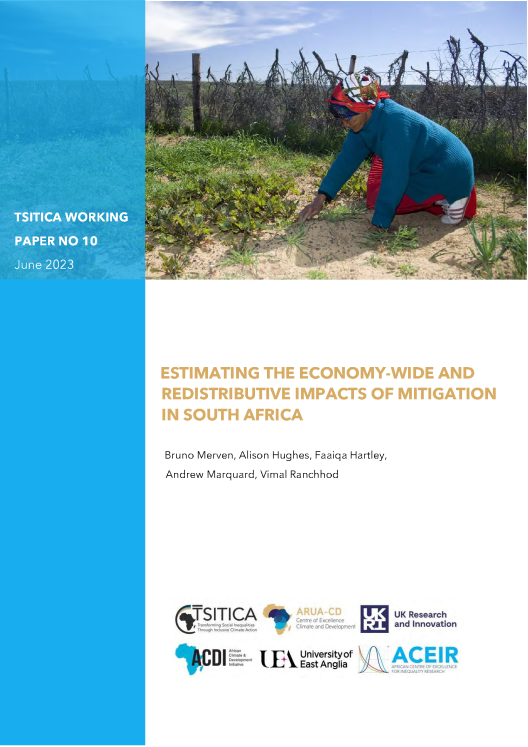Estimating the economy-wide and redistributive impacts of mitigation in South Africa
Bruno Merven, Alison Hughes, Faaiqa Hartley, Robert D. Osei, Andrew Marquard, Vimal Ranchhod
TSITICA Project Working Paper no. 10, June 2023.
Published by ARUA Centre of Excellence in Climate Change and Development & African Centre of Excellence for Inequality Research.

South Africa is characterised by high levels of poverty and inequality which make a large proportion of the population vulnerable to climate change. At the same time, the country is one of the largest producers of emissions per capita due to its dependence on fossil fuels. South Africa has committed to the global ambition to reduce emissions. In its Updated Nationally Determined Contribution, South Africa agreed to reduce emissions to between 398-510 Mt CO2-eq and 350-420 Mt CO2-eq. Such a transition requires structural changes in the economy which may have implications for households. This paper builds on previous research assessing the impacts of more ambitious mitigation actions in South Africa. The results show that increasing mitigation targets beyond those achieved under a least cost energy plan negatively affects real GDP, employment, and poverty. These impacts can however be mitigated or offset through climate mitigation financing as this reduces the investment burden otherwise placed on the economy. Failing to mitigate imposes potential costs on the South African economy – these costs could be larger than ambitious emissions reductions without climate financing. Read more
TSITICA was a collaborative, multi-country interdisciplinary research project. It brought together two ARUA Centres of Excellence with researchers from the universities of Ghana, Nairobi and Cape Town, and from the UK universities of Bristol, East Anglia and Manchester and the London School of Economics. The support of the African Research Universities Alliance and UK Research and Innovation are gratefully acknowledged. Visit project website.
